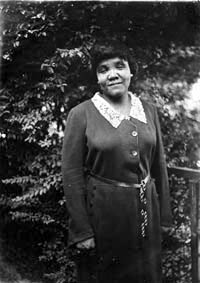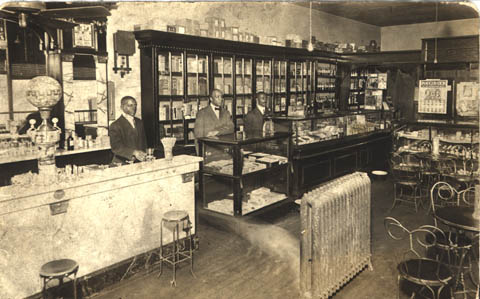Black History Month Spotlight – Mrs. Mary “Maggie” (Foster) Jones

Heritage of Black Highlanders
UNC Asheville Ramsey Library
Maggie Jones: bhcP77.10.4.2.21.1
Mary Maggie Foster was born November 19, 1877 in Jonesville, South Carolina, the second of three children born to Edmond and Lucinda (Brown) Foster.1
She was married in Buncombe County in 1897 to William Davis,2 and is listed in the 1900 census as a dressmaker, living with her mother on Grove Street.3 Her marriage was short-lived, however, and by 1905 she was married to Dr. Henry Edward Jones,4 of Aldrich, Alabama, the son of George & Lora (King) Jones.5 The 1910 census shows them living on Knob St., Henry working as a pharmacist and Maggie as a seamstress.6 Maggie Jones is listed on the website of the Heritage of Black Highlanders Collection and remembered as a pioneer in work among black women.
A great organizer of clubs for community improvement. Organized first Asheville branch of NC Federation of Negro Women’s Clubs and was a charter member of the state organization. She was a great community worker for the uplift of black women. Her husband, a pharmacist working in the early 1920’s, was one of the first black doctors to practice here.
She organized the Girl’s Industrial Club whose aim was to develop Christian leadership and skilled employment. The club later became part of the Phyllis Wheatley Branch of the YWCA.
She was a charter member of the Negro P. T. A. in the Asheville community and an active member of Mt. Zion Baptist Church.
Mrs. Jones involvement in this work of social uplift was part of a movement on the part of African American women across the nation to uplift the black race through ending racism and lynching, encouraging education, access to health care, women’s suffrage and helping the poorest of their race. (see more here)

Heritage of Black Highlanders Collection
UNCAsheville Ramsey Library
l-r: Thomas Moore; Dr. Jones; Dr. Torrence
Henry E. Jones of Greensboro was listed as having passed his license examination at a meeting of the North Carolina board of Pharmacy on March 8, 1904.7 The corner drugstore in the YMI was Dr. Jones’ place of business.
Ms. Jones was also an early member of the Ladies Auxilliary of YMI and she is remembered by Ernest McKissick and YMI Secretary William Trent for having played a vital part in fundraising to help purchase the YMI building.8 After the black community demanded their own hospital, rather than being relegated to Memorial Mission’s segregated ward, Maggie was among the fundraising canvassers who helped to raise funds for the Blue Ridge Hospital.8
Dr. and Mrs. Henry Jones were the parents of one son, Henry E. Jones, Jr. born in 1908, but sadly he died of a gunshot wound in 1948 at age 39.9 Mrs. Mattie Jones passed away at the age of 83 on September 24, 1961,9 and Dr. Henry E. Jones died three years later on January 19, 1964.9 As we celebrate Black History Month, Mrs. Maggie Jones’ life of service is especially worthy of remembrance and celebration.
- Ancestry.com. North Carolina, Death Certificates, 1909-1975 [database on-line]. Provo, UT, USA: Ancestry.com Operations Inc, 2007.
- “North Carolina, Marriages, 1759-1979,” index, FamilySearch (https://familysearch.org/pal:/MM9.1.1/F8MJ-CLC : accessed 03 Feb 2014), William Davis and Maggie Foster, 28 Dec 1897.
- Year: 1900; Census Place: Asheville Ward 4, Buncombe, North Carolina; Roll: 1184; Page: 8A; Enumeration District: 0140; FHL microfilm: 1241184.
- “North Carolina, Marriages, 1759-1979,” index, FamilySearch (https://familysearch.org/pal:/MM9.1.1/F8MJ-CL8 : accessed 03 Feb 2014), Henry E. Jones and Maggie Foster, 08 Nov 1905.
- Ancestry.com. North Carolina, Death Certificates, 1909-1975 [database on-line]. Provo, UT, USA: Ancestry.com Operations Inc, 2007.
- Year: 1910; Census Place: Asheville Ward 1, Buncombe, North Carolina; Roll: T624_1099; Page: 5A; Enumeration District: 0005; FHL microfilm: 1375112.
- American Druggist and Pharmaceutical Record, Volume 44 (Google eBook) American Druggist Publishing Company, 1904, pg 178
- Hornsby-Gutting, Angela. Black Manhood and Community Building in North Carolina, 1900-1930. Gainesville: University of Florida, 2009. Print.
- Ancestry.com. North Carolina, Death Certificates, 1909-1975 [database on-line]. Provo, UT, USA: Ancestry.com Operations Inc, 2007.
